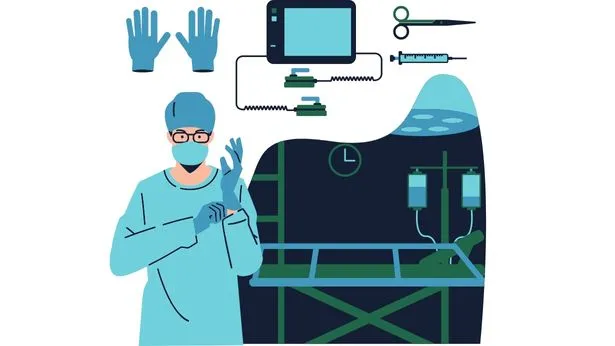The Ultimate Guide: How To Become an Oral Surgeon in 2025
While searching for an oral surgeon, there’s one question that always arises: “How to become an oral surgeon?”- Pursuing a career in oral surgery is both a rewarding and challenging path. If you’re driven by a passion for medicine, dentistry, and surgical precision, becoming an oral surgeon might be the perfect goal.But how do you get there? In this detailed blog, we’ll walk you through how to become an oral surgeon, covering each stage of the journey—from education to licensure and beyond.
Understanding the Oral Surgeon Career Path

Some oral surgeons are also experts in cosmetic facial processes or dental implants. Due to the technical demands of these surgeries, the oral surgeon education and training route is widespread, requiring many years of study and clinical practice.
Oral surgeons usually work:
1. Private surgical or dental practices.
2. Hospital or shock center.
3. University teaching hospital or research institute.
Oral Surgeon Education and Training Requirements

To embark on this career path, applicants need to fulfill several demanding oral and maxillofacial surgery criteria. Let’s talk about some of the most important academic and clinical phases:
1. Achieve a Bachelor’s Degree (4 Years)
The initial step in how to become an oral surgeon is obtaining a bachelor’s degree. The majority of students opt for science-rich fields such as:
Biology
Chemistry
Biochemistry
Pre-med or pre-dental studies
In this phase, concentrate on having a good GPA and taking prerequisites for dental school. Shadowing oral surgeons or dentists during this period is very helpful as well.
2. Take the Dental Admission Test (DAT)
The DAT is a standardized test for admission into US dental schools. It tests:
Knowledge of natural sciences
Perceptual ability
Reading comprehension
Quantitative reasoning
High scores on the DAT will improve your chances of being accepted into top dental programs, especially those with oral surgery tracks.
3. Graduate from Dental School (4 Years)
After passing the DAT, you’ll enroll in a four-year dental program leading to either a Doctor of Dental Surgery (DDS) or Doctor of Dental Medicine (DMD) degree. Both degrees are equivalent and cover a similar curriculum.
Dental school includes:
Advanced biological sciences
Clinical practice
Laboratory work
Patient care simulations
Near the completion of dental school, prospective oral surgery students will begin preparing for residency by getting hands-on training and procuring recommendation letters.
4. Finish an Oral and Maxillofacial Surgery Residency (4–6 Years)
Following dental school, you will need to undergo an accredited oral and maxillofacial surgery residency program, which can last between four and six years.
The residency involves several things:
Hospital-based surgical training
Anesthesia and sedation techniques
Emergency medicine
Reconstructive facial surgery
Rotations in general surgery, internal medicine, and intensive care units
5. Pass National Board Dental Examinations (NBDE)
The NBDE Part I and Part II are necessary to prove your knowledge of dentistry. These need to be passed to get licensed.
6. Get a State License
You will need to get a dental license in the state you want to practice in. Every state has its dental board and regulations, including:
Background checks
Clinical exams
Documentation of residency completion
Also Read: Highest Paying Dental Jobs Salaries in USA (2025)
Total Time Commitment
Overall, it takes about 12 to 14 years of high school to become a fully licensed oral surgeon in the US. This includes graduation education, dental school, and surgical residency. Alternative board certification may require additional preparation time.
Final Thought on Oral Surgeon Career Path
With a thorough understanding of how to become an oral surgeon, it’s obvious that it takes hard work, determination, and passion. From acing science classes as an undergraduate to learning surgical skills in a hospital residency, the journey is crucial. But the payoff, personal and professional, is well worth it.
Ready to take the first step toward your dream career? Start by researching colleges with strong pre-dental or science programs and speak to academic advisors about aligning your education with your goal of becoming an oral surgeon.
As the demand for skilled professionals continues to grow, oral surgeon recruitment is becoming increasingly competitive, so it’s essential to build a strong academic and clinical foundation early on.
FAQs on Ooral Surgeon Education and Training
Q1. How long does it take to become an oral surgeon in the US?
It typically takes 12 to 14 years post-high school, including undergraduate studies, dental school, and surgical residency.
Q2. What are the requirements for oral and maxillofacial surgery certification?
To become board-certified, you will need to complete an accredited residency and pass the written and oral examinations given by ABOMS.
Q3. Do I have to attend medical school to become an oral surgeon?
No, an MD is not needed to practice oral surgery. Some residency programs, however, do offer an integrated MD track, which will improve your credentials.
Q4. What is the US average oral surgeon salary?
As of 2025, oral surgeons in the US receive an average salary of $450,000 – $ 500,000+ based on experience, specialty, and location.
Q5. Is board certification a requirement?
No, but it is highly encouraged and usually demanded for hospital or teaching positions.
Q6. What is the initial step in the oral surgeon education and training pathway?
The process starts off by obtaining a bachelor’s degree in a science field and sitting for the Dental Admission Test.
Q7. What are the major steps to become an oral surgeon in the US?
Get a bachelor’s degree, pass the DAT, graduate from dental school, go through a residency, get a state license, and optionally become board certified.
Q8. Is the oral surgeon profession competitive?
Yes, one of the most demanding dental specialties with few residency positions and high academic standards.
Related Article: Why Oral Surgeons Are in High





